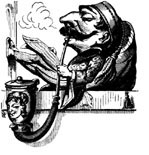
The Halifax School & the Fallacy at the Heart of Anglicanism
A BRIEF HISTORY
Ulysses was lucky. His nostalgia brought him home to Ithaca. Prayer Book Anglicans in the late 20th century were not so lucky. Their nostalgia could find no home, no resting place in the Anglican Communion, not even in the breakaway churches.
Nostalgia is a deep and painful longing for something dear but lost. The longing for Eden is nostalgia. The wanderer’s longing for home, for place and kin, is nostalgia. The Prayer Book Anglican’s longing for truth in liturgical praxis was nostalgia, a nostalgia for Eden, a nostalgia for home. I would like to tell the tale of this nostalgia in its most sophisticated manifestation, a tale of historical importance, though it is a bittersweet tale to me as one who was ordained in the Anglican Church of Canada in 1982.
It is a tale of a well-organized and lofty effort by theologians, parish clergy, and laymen to recover the essence of Anglicanism — intellectually, liturgically, spiritually, and pastorally — while remaining in the Anglican Church of Canada. Let us call the engine that powered this effort the Halifax School of Theology, although it is a name that was never used historically. The movement was centered at the University of King’s College and in the Department of Classics at Dalhousie University, both in Halifax, Nova Scotia.
The Halifax School was deeply influenced by two strands of thought: the Hegelianism of Prof. James A. Doull (1918-2001) of the Dalhousie Classics Department and the Augustinianism of Rev. Dr. Robert D. Crouse (1930-2011) of Dalhousie and the Foundation Year Programme at King’s College. The extraordinary learning of these two scholars, and their deep attention to the original texts from antiquity to the present day, profoundly shaped this school of thought. Another significant influence was the old Christian socialism of the Anglo-Catholic clergy of Nova Scotia, paralleled in the Catholic Antigonish Movement (about which I wrote in the Jul.-Aug. and Sept. 2018 issues of the NOR). These strands were woven together in the mind of Rev. Dr. Wayne J. Hankey (1944-2022), a student of both Doull and Crouse, who supplied, in addition to his own extension of the thought of his masters in studies of Thomism and Neoplatonism, the political will to confront first the faculties at King’s College and in Dalhousie Classics, then the hierarchy of the Diocese of Nova Scotia, and finally the liberal ecclesiastical establishment in both Canada and the United States.
You May Also Enjoy
Newman challenged laymen to sanctify the world and the Church; he challenged clergy to co-operate with and utilize lay energy and wisdom.
Authentic authority, universality, and a firm theological grounding for social action -- these are the overarching factors that lead to Rome.
Some mainline Protestant denominations are in rapid decline because they have no message that is discernibly different from the secular culture.

